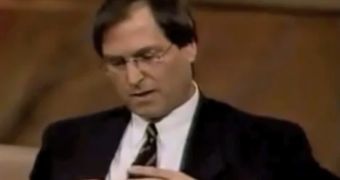A televised interview with Steve Jobs from 1996 holds key clues as to how the former Apple CEO thinks and, even better, how he did exactly what he put his mind to, as the boss of the company he co-founded with Steve Wozniak.
Louis Rukeyser (January 30, 1933 – May 2, 2006), an American financial journalist, columnist, and commentator, through print, radio, and television, interviewed Jobs in 1996 on a number of topics, including Pixar, NeXT and, of course, the very company he had co-founded, Apple (then Apple Computer).
At one point in the interview, Rukeyser said, “You first came to public attention with Apple. In recent weeks it's been one of the failure stories of Wall Street, and indeed of the American economy. What went wrong at Apple?”
According to a transcript by CNNMoney, Jobs (then CEO of Pixar) responded:
“Oh gosh. You know I haven't been there in a long time. My perception may not be complete. But from the way I see it, Apple was a company that was based on innovation. When I left Apple ten years ago, we were ten years ahead of anybody else. It took Microsoft ten years to copy Windows.
The problem was that Apple stood still. Even though it invested cumulatively billions in R&D, the output has not been there. People have caught up with it, and its differentiation has eroded, in particular with respect to Microsoft.
And so the way out for Apple -- and I think Apple still has a future; there are some awfully good people there and there is tremendous brand loyalty to that company -- I think the way out is not to slash and burn, it's to innovate. That's how Apple got to its glory, and that's how Apple could return to it.”
And that’s how it did five years later, during which time Jobs had returned to Apple and got reinstated as CEO.
But it wasn’t by making better Macs, or even by means of the revolutionary iPod that got things on a roll again (though iPods did play a major roll in Apple’s forthcoming ascension).
It was the introduction of iTunes in 2001, a media player computer program, used for playing and organizing, but mostly for buying digital music and other media on computers.
iTunes became the basis of getting music onto an iPod, as well as to download music legally, from an intuitive and unified interface.
This is where Apple started to make a lot of sense for many consumers, both desktop-wise, and on the portable front.
And so, Apple came into everyone’s attention, yet again. Suddenly, everything Apple made and sold great.
But most importantly, every product started to feel and look completely new. Or, as Steve Jobs would put it, ‘innovative’.

 14 DAY TRIAL //
14 DAY TRIAL //